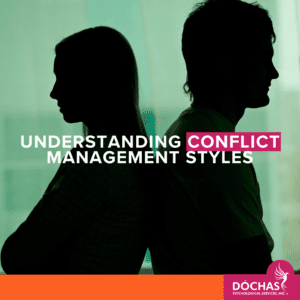Everyone navigates various types of conflict in their everyday life, ranging from conflict in the workplace, in relationships, at home, and more. When these conflicts go unmonitored, they can cause significant stress on our system. Interestingly, there are numerous ways one can go about navigating conflicts as they arise, many of which are influenced by conflict management styles.
It’s Cheyanne on the Dóchas blog, and today I am going to explain the five conflict styles and how they impact our life experiences.
The Five Styles
- Accommodating: this conflict style occurs when individuals adjust their expectations or comply with others in order to satisfy the other party and mitigate disputes.
- Avoiding: this conflict style is described as a type of aversion to ignore the challenge or withdraw from the situation.
- Compromising: this conflict style involves steps towards a mutual agreement where all parties are content – to some extent. Compromising typically requires a level of cooperation to ensure some of these needs are met.
- Collaborating: this conflict style involves taking on a more active role, with parties holding open conversations and negotiations to find a suitable solution accepted by all.
- Competing: like collaboration, this conflict style involves taking an active role in the conflict, though it is described as a method where individuals are mainly focused on ensuring their own concerns are met, despite the negative impact it may cause the other party.
Now that we have looked at the different styles of conflict management, it is important to remember that context is key: some situations may require a different approach than others. That being said, many individuals tend to identify more closely with one or two of the styles.
Why Are Conflict Management Styles Important?
With an increased understanding of our conflict management styles, we can begin to develop our self-awareness and identify the impact they may have on ourselves and others. With this understanding, we can empower ourselves and take a more conscious role in how we respond to our environment. As mentioned above, conflict can have a significant impact on our wellbeing. Therefore, exploring this part of ourselves can create an opportunity for us to reclaim control and approach conflict in a way that aligns with our values.

Helpful Questions to Ask Ourselves
Spend some time reflecting on past conflicts that you have experienced.
- What was your natural response to the conflict?
- Did you align more with one style than the others?
- Are there any conflict management styles that you tend to avoid?
- Is there a style that you want to develop or strengthen further in the future?
Evaluate the impact these styles have had on your life.
- Have they served a purpose or met an underlying need?
- Have they affected your relationships or view of self-worth?
Identify your values and what is important to you when it comes to navigating conflict. We all have different priorities and varying core beliefs, so connecting our values to the way we approach and respond to conflict can help develop a stronger alignment with our inner selves. If you would like to further explore your conflict style and the impact this may be having on your life, you can reach us at 780-446-0300 or at info@dochaspsych.com.
About Dóchas Psychological
Dóchas Psychological Services is a well-established and trusted therapy clinic located in Spruce Grove, Alberta. At Dóchas we value the idea that everyone deserves a safe space. Through connection and education, our team works hard to build a trustworthy relationship with each of our clients. It is our goal to create a community for our clients to feel like they belong.
Disclaimer
Information provided through Dóchas Psychological Services blogs or vlogs is meant for educational purposes only. They are NOT medical or mental health advice. You can read more about our disclaimer here.


